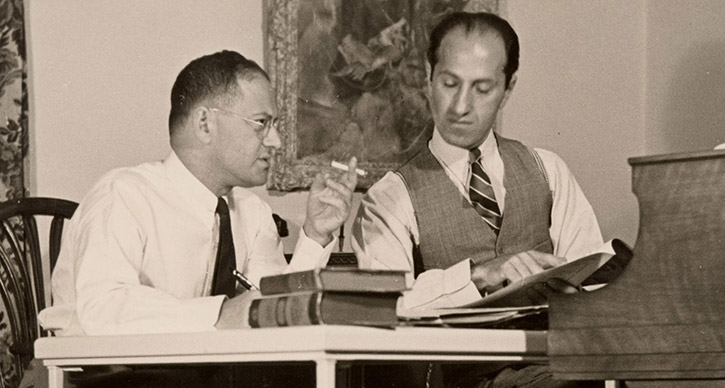The Heart of History: Reconsidering the Great American Songbook
Editor’s note: Looking to hear selections from The Great American Songbook live? Audra McDonald performs on September 15, 2013.

Photo: Ira and George Gershwin, Beverly Hills, 1937 (Ira and Leonore Gershwin Trusts (used by permission).
If a nation kept a diary, it would be in its songs. Song is where poetry meets praxis, where the imagination hits the dance floor and the ineffable finds expression in the everyday. Verse envelops life’s detail to offer both prosaic insight and poetic pleasures; yet, in song, music expands the emotional richness of lyrical syntax, transforming words into dreams, disappointments into wisdom. Cast in the delight of melody, harmony, and rhythm, song thrives even without specific meaning. In lyrical enigma resides possibility, whether in Schubert’s Lieder or on Top 40 radio, song’s ambiguities invite association to make the popular deeply personal. Some becomes “our song,” as music collides with living. These human riches of song may well transcend time and place, yet song is equally historic, preserving ideas and events that forged a path to the present.
In the United States, entries in the Great American Diary of Song include ballads by a signer of the Declaration of Independence—Francis Hopkinson—and spirituals that tell of the strengths, sufferings, and hope of African American slaves. The legendary songwriters of Tin Pan Alley, of Broadway, of Hollywood strove for hits to catalyze immediate commercial success, yet surprisingly often they created classics that captured the concerns, optimism, and challenges of the times. Irving Berlin’s “Puttin’ on the Ritz” (1929), Yip Harburg and Jay Gorney’s “Brother, Can You Spare a Dime?” (1932) and “Over the Rainbow” (1939) by Harold Arlen and Harburg explore fundamental human themes while they articulate a time of traumatic change from exuberance to Great Depression and its aftermath in American history.
The Gershwin brothers had a particular knack for catching the spirit of the age and for all time. Their many love songs, such as the unknown gem “Ask Me Again” (rediscovered by Michael Feinstein and finally introduced to the public in a 1990 production of Oh Kay!), offer more than tales of heart meets heart, they tell of the everyday as universal—here in the nervous and joyous first blush of infatuation and the dreamy ideals of romance. “Fascinating Rhythm,” in contrast, merges the energy and optimism of the Twenties with its explosive cultural tension that marks jazz as the signal success of Harlem’s artistic renaissance and its quest for Civil Rights. Or maybe it’s the iconic lullaby “Summertime” from Porgy and Bess, arguably the most frequently recorded song in audio history (in competition with only Paul McCartney’s “Yesterday”) and one now forever associated with beloved UMS artist Audra McDonald in her 2012 Tony Award winning performance as Bess. The Gershwins’ creative strength is on vivid display in each rendition; their songs grow ever richer through the artistry of countless performers and performances.
It is thus with both great excitement and equal humility that the University of Michigan’s American Music Institute at the School of Music, Theatre & Dance announces the George and Ira Gershwin Critical Edition. Created in partnership with the Gershwin family, this all-new series of publications will — for the first time — bring the rigor of scholarly editing to the realization of the Gershwins’ musical legacy. On the stages of Hill Auditorium, Britton Recital Hall, and Power Center, faculty artists and student performers will bring their interpretive energies to the Gershwins’ work to inform and refine the editorial process. The project as a whole will inspire a range of courses, talks, and research examining the cultural contributions of the Gershwins in context of a broad accompanying transformation of American life, from the Victorian Age through the Jazz Age up through today.
Video: Audra McDonald sings “Summertime” from The Gershwins’ Porgy and Bess.
An encyclopedia never to be finished, the Great American Songbook has much to say about the past as well as the present, making it a vital locus for research and study as well as performance on campus and in the classroom and on campus. Song does more than entertain, it celebrates, it informs, it heightens the moment as it encodes ideology for analysis. Most importantly, song gives history a heart. Whether given voice in the interpretations of the art’s great singers, or by a raucous chorus of kids in the family car, song recruits the beauty of the ages as a tool for understanding, here and now.






